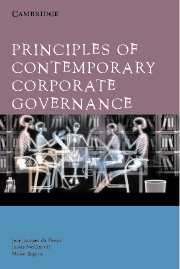Book contents
- Frontmatter
- Contents
- Table of cases
- Table of statutes
- Preface
- PART ONE CORPORATE GOVERNANCE: AN OVERVIEW
- 1 The concept ‘corporate governance’ and essential corporate governance principles
- 2 Stakeholders in corporate governance
- 3 Board functions and structures
- 4 Types of company directors and officers
- PART TWO CORPORATE GOVERNANCE IN AUSTRALIA
- PART THREE CORPORATE GOVERNANCE IN PRACTICE
- PART FOUR CORPORATE GOVERNANCE: AN INTERNATIONAL PERSPECTIVE
- PART FIVE CORPORATE GOVERNANCE: GOING FORWARD
- Index
1 - The concept ‘corporate governance’ and essential corporate governance principles
- Frontmatter
- Contents
- Table of cases
- Table of statutes
- Preface
- PART ONE CORPORATE GOVERNANCE: AN OVERVIEW
- 1 The concept ‘corporate governance’ and essential corporate governance principles
- 2 Stakeholders in corporate governance
- 3 Board functions and structures
- 4 Types of company directors and officers
- PART TWO CORPORATE GOVERNANCE IN AUSTRALIA
- PART THREE CORPORATE GOVERNANCE IN PRACTICE
- PART FOUR CORPORATE GOVERNANCE: AN INTERNATIONAL PERSPECTIVE
- PART FIVE CORPORATE GOVERNANCE: GOING FORWARD
- Index
Summary
It is necessary only for the good man to do nothing for evil to triumph.
– Words attributed to Edmund Burke (18th-century English political philosopher)
– The Australian, Monday 6 December 2004, 4, reporting on the most favoured phrase of quotation-lovers as determined by an Oxford University Press poll.
The meaning of corporate governance
Generally
One thing that is clear about the concept of corporate governance is that there is no set definition as to what it means. Commentators often speak of corporate governance as an indefinable term, something – like love and happiness – which we essentially know the nature of, but for which words do not provide an accurate picture. Many have attempted to lay down a general working definition of corporate governance, yet one definition varies from another, and this often leads to confusion. Others, like the UK Cadbury Report (1992) and the South African King Report (1994), basically only say that corporate governance is ‘the system by which companies are directed and controlled’. That seems not particularly helpful in clarifying the meaning of the term ‘corporate governance’. Surprisingly, until quite recently, it was quite hard to find a formal definition of ‘corporate governance’, notwithstanding the ‘voluminous literature’ on this topic.
Several recent reports dealing with corporate governance have attempted to clarify the concept. One, for example, said that:
Corporate governance refers generally to the legal and organisational framework within which, and the principles and processes by which, corporations are governed. It refers in particular to the powers, accountability and relationships of those who participate in the direction and control of a company. […]
- Type
- Chapter
- Information
- Principles of Contemporary Corporate Governance , pp. 1 - 13Publisher: Cambridge University PressPrint publication year: 2005
- 2
- Cited by



